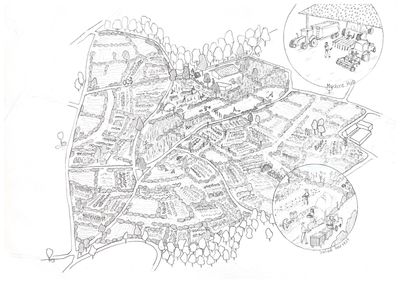Future FarmersBecoming an AgricitizenFabian Perner, Michelle Ciorciari, Cara Steiner, and Maria Wenzl

On the site of Zürich Nord the agricultural land that belongs to a farm is scattered across the territory. This is due to inheritance division of agricultural properties, sale and lease of land, favoured by mechanisation throughout the past 70 years. Today, the use tractors and other farm machinery is indispensable to farming. Nevertheless, the use of heavy machinery has its downsides: It causes soil compaction which potentially reduces harvests and favours erosion and floods.
What kind of farms farm the land in Zürich Nord? To get a better understanding of the farm structures, we interviewed several farmers who work on the site. What we discovered were three main operating models: family farms, KMU’s (small and medium sized businesses) and community-based farms (Solidarische Landwirtschaft).
Most businesses on the site are family-run. But as reports and statistics have shown, this kind of practice is often economically unsustainable, because family work is sometimes unpaid. Younger generations tend to take other career paths. At the same time, farming costs are rising, and direct payments by the state are often not sufficient to sustain the farm. How are these tendencies going to influence the future of the site?
To reduce the pressure farmers are subject to, our proposal will make farming on the site more attractive and accessible to everyone. It will be possible to support farmers to adapt to the increased workload of a more productive landscape. Managing the new agricultural society requires a new form of organisation where land is common and cared for.